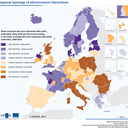-
Posters | 22 October 2017
-
Synthesis Reports | 12 October 2017
Territorial Cooperation for the future of Europe - ESPON contribution to the debate on Cohesion Policy post-2020
-
Featured Map | 10 October 2017
A better understanding of FDI inflows and their effects on cities and regions helps to embrace the benefits of globalisation and prevents potentially negative effects.
-
Policy Briefs | 10 October 2017
This paper aims at informing policy-makers at the EU level about the benefits and added value of the interregional programmes in times of resource scarcity.
-
Policy | 22 June 2017
Polycentric territorial patterns encourage more balanced development between regions and more co-operative urban-rural relationships.
-
 Case Studies | 22 June 2017
Case Studies | 22 June 2017Some European capital cities jointly function as a gateway in the form of a polycentric network with regard to specific functions in a macro-region.
-
 Evidence | 22 June 2017
Evidence | 22 June 2017The current models and further potentials of polycentric development at different scales in Europe have been analysed by ESPON on the basis of urban structures, accessibility and cooperation
-
 Case Studies | 22 June 2017
Case Studies | 22 June 2017Cross-border metropolitan areas link national urban systems in a way that can generate a number of new opportunities and agglomeration economies.
-
Policy Briefs | 7 April 2017
March 2017 - ESPON presents territorial observations on key development patterns of territories with geographic specificities (coastal areas, islands, mountains and sparsely populated regions) and key messages for policy-makers for designing and implementing development strategies specifically tailored to the needs of these places.
-
 Guidance | 21 November 2016
Guidance | 21 November 2016Practical Tools for Analysis and Policy-making
-
 Policy Briefs | 28 October 2016
Policy Briefs | 28 October 2016In times of decreasing resources and growing responsibilities, a transition to a circular economy is both a necessity and an opportunity for cities and regions, with the potential to offer long-lasting economic, environmental and social benefits. Many local and regional authorities are already making efforts towards a more circular economy.
-
 Policy Briefs | 7 October 2016
Policy Briefs | 7 October 2016Polycentricity is a concept that encourages regions and cities, working with neighbouring territories, to explore common strengths and reveal potential complementarities, which brings added value that cannot be achieved by the individual regions and cities in isolation.





